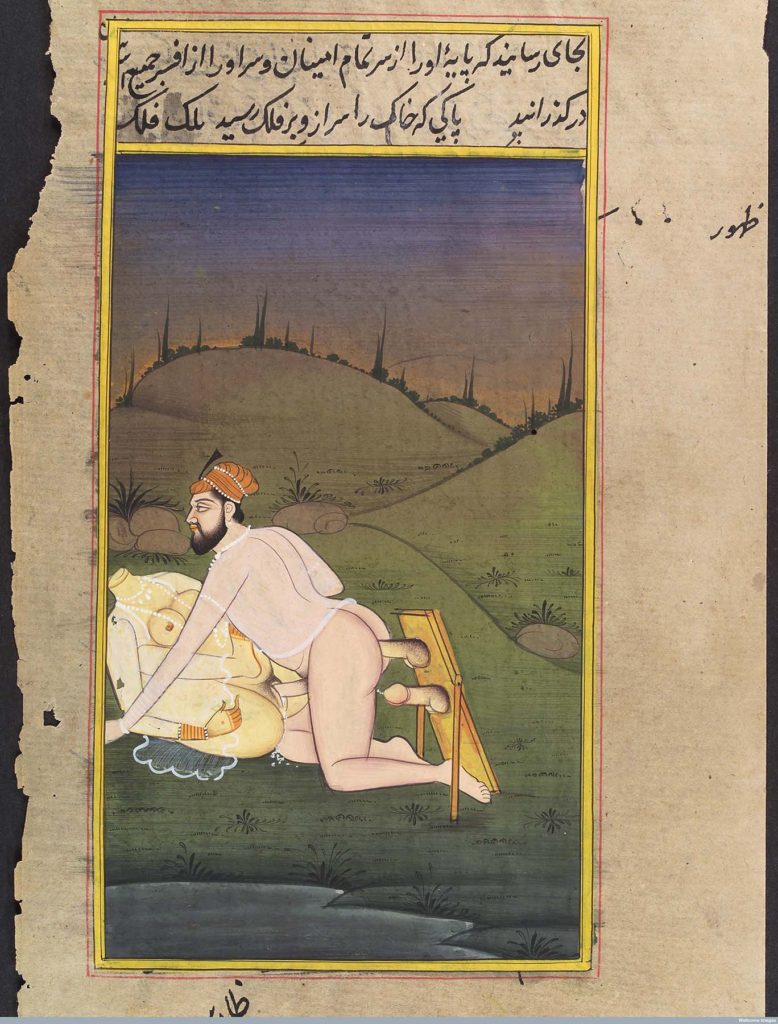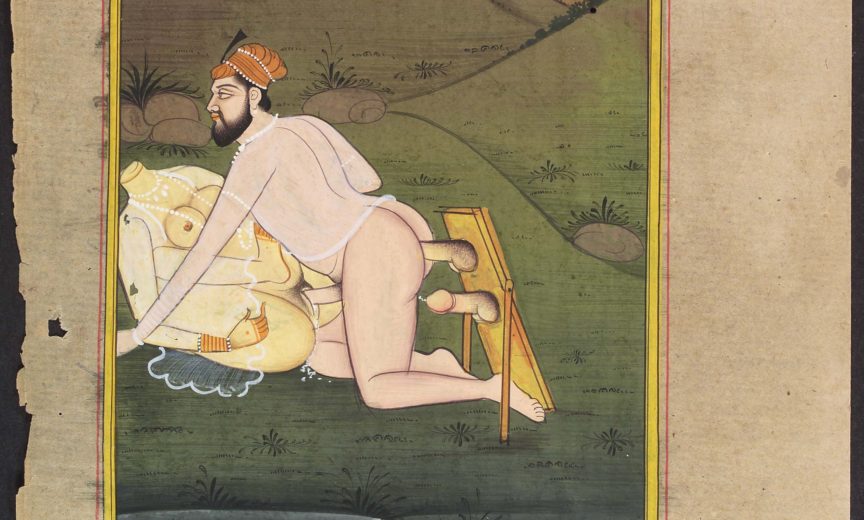In my travels around the internet to find interesting (well at least to me) pieces of sexual history, I’ve come across some things that I don’t seem to be able to fit in anywhere else. They just need to stand alone and be admired, discussed or pondered over. One such thing is one particular photo I found while researching sex dolls. The painting shows a copulating couple using some sort of improvised sex toy or machine. The first thing I notice is the two dildos are attached to a board, and one of them is being used for anal sex. Upon closer inspection, I see that the woman is headless. I find the same thing every time I search for more info about this painting, an article using it as evidence of sex doll use in early Persian culture. But is it really a sex doll? Is it really from early Persian culture? This painting was a mystery I just had to solve.
I’ve done some investigating but so far haven’t found out anything that relates to this particular artwork. Not even Wellcome Library in London which houses the actual manuscript page in its collections has any more information other than a possible date. Wellcome has it dated as 19th century, which means it’s not a painting from the heydays of Mughal paintings. It would have to be from the 15th-17th centuries. The piece looks to be part of a manuscript, and there are several other pages done in a style that appear to be part of a series. The other pages have similar looking backgrounds and the same man playing a reoccurring role in them. The manuscript pages seem more like a catalog of sins than a sex manual like the Kama Sutra. The other paintings show the same man copulating with a deer, having anal sex with what looks like a demon or the devil, a crocodile performing cunnilingus on a female demon, women masturbating with vegetables, and more. It’s possible that the subject matter is influenced by the time period. The 19th century found India becoming much more conservative about sex.
There have been several centuries of evolution in Mughal painting before we get to the time of this painting. The Mughal’s Muslim Persianate empire started in the 16th century. The Empire peaked in the mid 17th century, which was a golden age for architecture that included the Taj Mahal. By the mid 18th century, the Mughal’s influence started to decline and was given over entirely to the British Empire by the mid 19th century. During that time, the empire was known not only for its art and architecture but also for science and technology. Mughal paintings were often about the lives of royalty, including their sex lives. The sex portrayed in these paintings is quite explicit, even if the body positioning is painfully unrealistic. Erotic Hindu art greatly influenced Mughal art. Sex was shown as natural and commonplace, even if those practicing it are Mughal kings with their large harems or gods and goddesses. The tone of this painting and the others that seem to be from the same manuscript is entirely different than the ones from the three centuries before it. The sex depicted here is distinctly taboo. It has 19th-century Victorian moral hangups written all over it.
Knowing that this painting is from the 19th century also means that it’s not proof of the early use of sex dolls. I also find that the “headless model,” as Wellcome refers to the figure the man is copulating with, doesn’t look much like a doll. It has pubic hair, and henna on the hands and feet. Perhaps it’s more of a depiction of a headless woman, a way of further dehumanizing the already extremely dehumanized women of the Mughal dynasty. Another possibility is that the figure is a headless goddess, something not uncommon among Hindu deities. The most notable is the tantric goddess, Chinnamasta. She is often shown holding her head while blood gushes in three streams from her neck. This makes it unlikely that the figure in this painting is her specifically. It could be just a random headless goddess. And as if having sex with a headless goddess/doll wasn’t edgy enough, there is the double dildo contraption behind him.
The two realistic dildos, including hair covered scrotum, appear to be attached to a swinging board. I’d bet you dollars to donuts that he can push back on the bottom of that board and have the top part push forward to penetrate himself anally. He may not have all the cast members for an official threesome present, but he’s MacGyvered a sex doll and dildo board for a DIY threeway. We’re talking major maker innovation here.
I still can’t quite figure out where that second dildo is going. Perhaps he borrowed this from someone who uses it for double penetration. Or maybe there’s another painting where headless goddess sex doll is going airtight.
Perhaps I have thought way too long about this painting.
I can’t tell what was the purpose behind these manuscript pages. Were they part of someone’s kinky manuscript of sexy perversions that were meant to titillate or Victorian Christian propaganda trying to make this Mughal king look like the host of a satanically influenced sex party that includes demons, root vegetable dildos, crocodiles, and vagina birds? Yes, vagina birds.
Most of these paintings have some writing at the top, as this one does. I couldn’t find any translations and an email to Wellcome about the text has yet to yield an answer. The writing is in Urdu, which I would love to get translated at some point. I didn’t want to wait until I got a translation to write about this painting. Lakeside anal dildo sex seemed the perfect thing to share with you before Anal August is over. I’m going to continue looking into the mystery of 19th-century pseudo-erotic Mughal paintings. Look forward to sharing what I’ve learned with you.
Here is the full image:

Credit: Wellcome Library, London. Wellcome Images
images@wellcome.ac.uk
http://wellcomeimages.org


